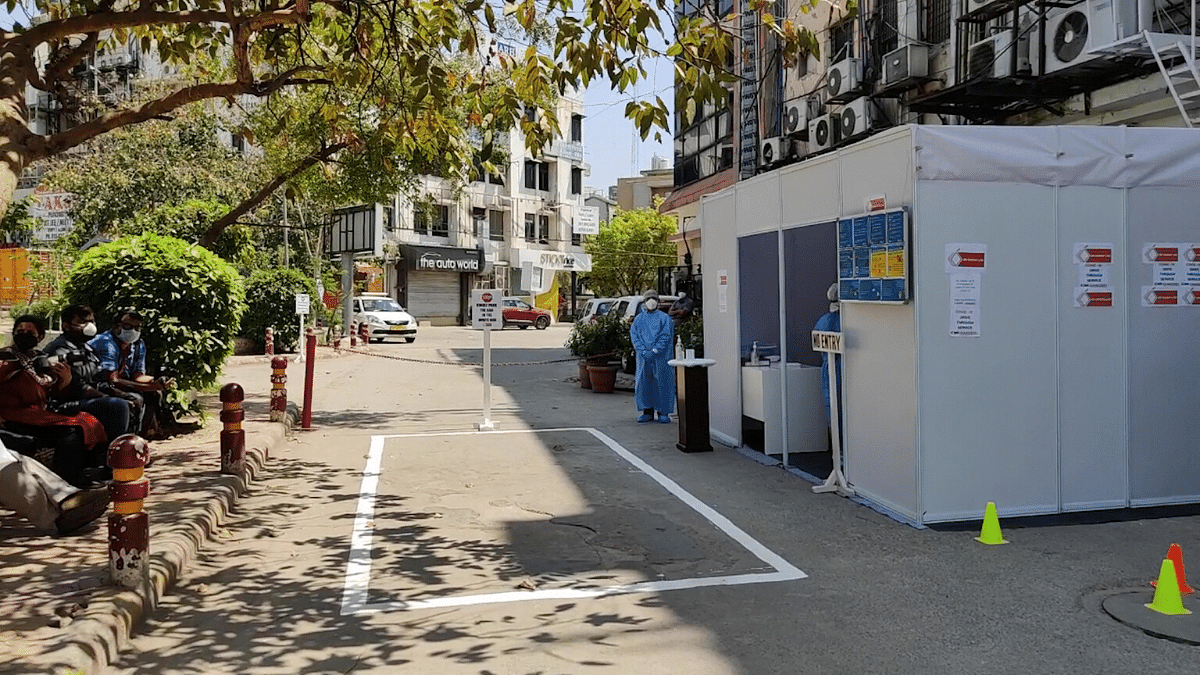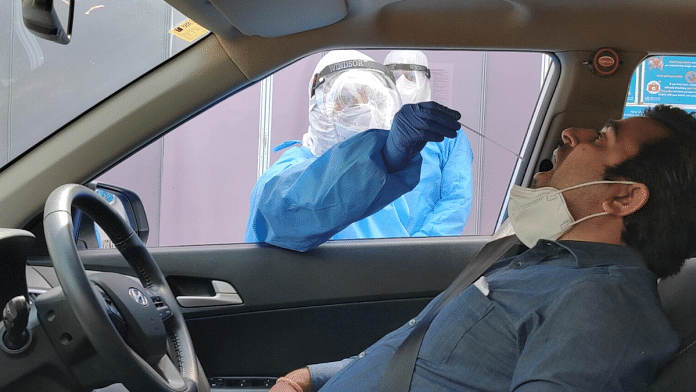New Delhi: Dr Dangs Lab, one of the first private labs allowed to test for coronavirus, has operationalised India’s first drive-through Covid-19 test site in west Punjabi Bagh in the national capital.
So far, private labs had only been collecting samples of suspected Covid-19 patients by deploying technicians to their homes.
Speaking to ThePrint about the site launched Monday, the lab’s chief executive Dr Arjun Dang said, “I took inspiration from South Korea’s model that has been highly successful… and also keeping in mind the apprehension that people have when someone comes into their house especially because a lot of us live in joint families as well.”
At the site in Punjabi Bagh’s Central Market, he said that since registration opened from Sunday afternoon, over a dozen people have booked for the drive-through test, for which permission had to be sought from the Delhi Police, the Municipal Corporation of Delhi and the Punjabi Bagh Central Market Association.
ThePrint reached the South Delhi Municipal Corporation (SDMC) commissioner and the Punjabi Bagh station house officer (SHO) seeking a comment, but they refused.
Also read: Aap chronology samajhiye: Did Modi buckle under Trump’s pressure on HCQ for COVID-19?
The process
The drive-through test begins with an online information sheet that the individual is required to fill out. It contains information fields about the “patient proforma” i.e. their symptoms as well as the doctor’s prescription. The patients are also required to jot down their car number and the make and model of their car, which is then verified ahead of the swab collection.
Each test costs Rs 4,500, in accordance with the guidelines set for private labs by the Indian Council of Medical Research, India’s apex medical body.
Once the registration is completed, the patient is given a list of instructions in the form of a PDF document. The document titled ‘Covid-19 Drive Thru – Dr. Dangs Lab’ contains a set of pointers under ‘What’, ‘Why’ and ‘How’ sections. “A Drive-thru service is essentially the safest way to give a Covid-19 sample,” the document reads.
When the patient reaches Central Market, they are guided through a 30-40 metre long stretch.
Arjun Dang explained that there are three stations in the drive-through, each being manned by two personnel. At the first station, the medical staff confirms the identity of the vehicle, while a sign is held up directing the patient to be seated on the right side of the vehicle.
The second station is in a 10-metre long lane that has been cordoned off using a barricade. The car has to be parked inside a white box at the end of the lane, next to a booth where personnel wearing personal protective equipment wait to collect the swabs.

“Once the car is positioned, a series of signs are shown to the patient to tell them what the procedure is — that includes telling the patient to tilt their head back, roll down the window. Two swabs are then taken — one from the nose and one from the throat,” Arjun said.
The sample is then secured in a triple-layer packing. This means it will first be dispersed in a viral transport medium, a liquid inside a tube which is then wrapped up in cotton gauze and parafilm. The tube is kept inside a small container that is then locked in a thermocol along with ice packs.
The samples are transported in a car to the lab’s Covid-19 testing facility at its Hauz Khas branch. Four cars are used to transport the samples, each heading out at intervals of 30-40 minutes taking with it one to two samples. The reports are then emailed to patients or published on their website where it can be accessed using a unique ID.
Dr Devjani De, a microbiologist at Dr Dangs Lab, explained that the drive-through test is not being implemented at the facility in Hauz Khas, where patients are still availing other diagnostic services, to avoid the risk of contamination.
“We don’t want to mix the stations in that case… The facility at Hauz Khas is used for pan-diagnostic services. So we get patients for every other condition,” De told ThePrint over the phone.
Also read: J&K targets Russian poplars in Covid-19 fight, experts worry about ‘ecological disaster’
Advantages of the model
Drive-through centers have played a crucial role in curbing the epidemic in South Korea, where 15,000 to 20,000 tests are conducted daily.
“For a strategic pandemic planning and preparedness, this model has seemed to do wonders… This protocol ensures that there is minimal risk to the patients who are coming for testing as well as the health care workers by minimising the exposure,” Devjani said.
She also pointed to studies conducted by Stanford Medicine, which noted that a “drive-through model” facilitates testing of a large number of people while mitigating the spread of infections.
Dr Manoj B. Jais, who oversees the Covid-19 testing facility at Lady Hardinge Medical College in the national capital, agreed with this.
“This is a good way of keeping doctors at a safe distance. It’s also good for patients who don’t want to go to the government hospitals or want someone to come inside their house to collect samples. Such booths should also be made in government hospitals,” he said.
The model has also provided an answer for the privacy concerns being raised by suspected Covid-19 patients. The past few weeks have seen multiple reports of people being ostracised if they so much as test or have a travel history. This includes multiple instances of healthcare professionals and flight attendants facing discrimination, with some being asked to vacate their houses.
Amarjeet Khokhar, a technician at Dr Dangs Lab who has been tasked with collecting samples from home, exercises several precautions on every visit in order to avoid causing panic.
“When we go to the patient, we don’t wear our uniforms so that there is no panic in the neighbourhood. They don’t know that Covid-19 testing is happening in the house. So we don’t want to raise an alarm,” he said.
Considering the benefits, Dr Dangs Lab, which currently receives about 30 samples a day, is also hoping to extend the test to those with two-wheelers.
“Whether more people will sign up or not depends on awareness through social media platforms and also word of mouth. But this strategic planning and preparedness will definitely serve the population at large in the times to come as more number of people can now come and get tested,” De added.
ThePrint reached three other private labs to confirm if they plan to launch a drive-through model of testing. Only one, Metropolis Health Ltd in Mumbai, confirmed such a plan.
Also read: Doctors, nurses, paramedics, healthcare can be India’s new engine of growth after Covid-19



